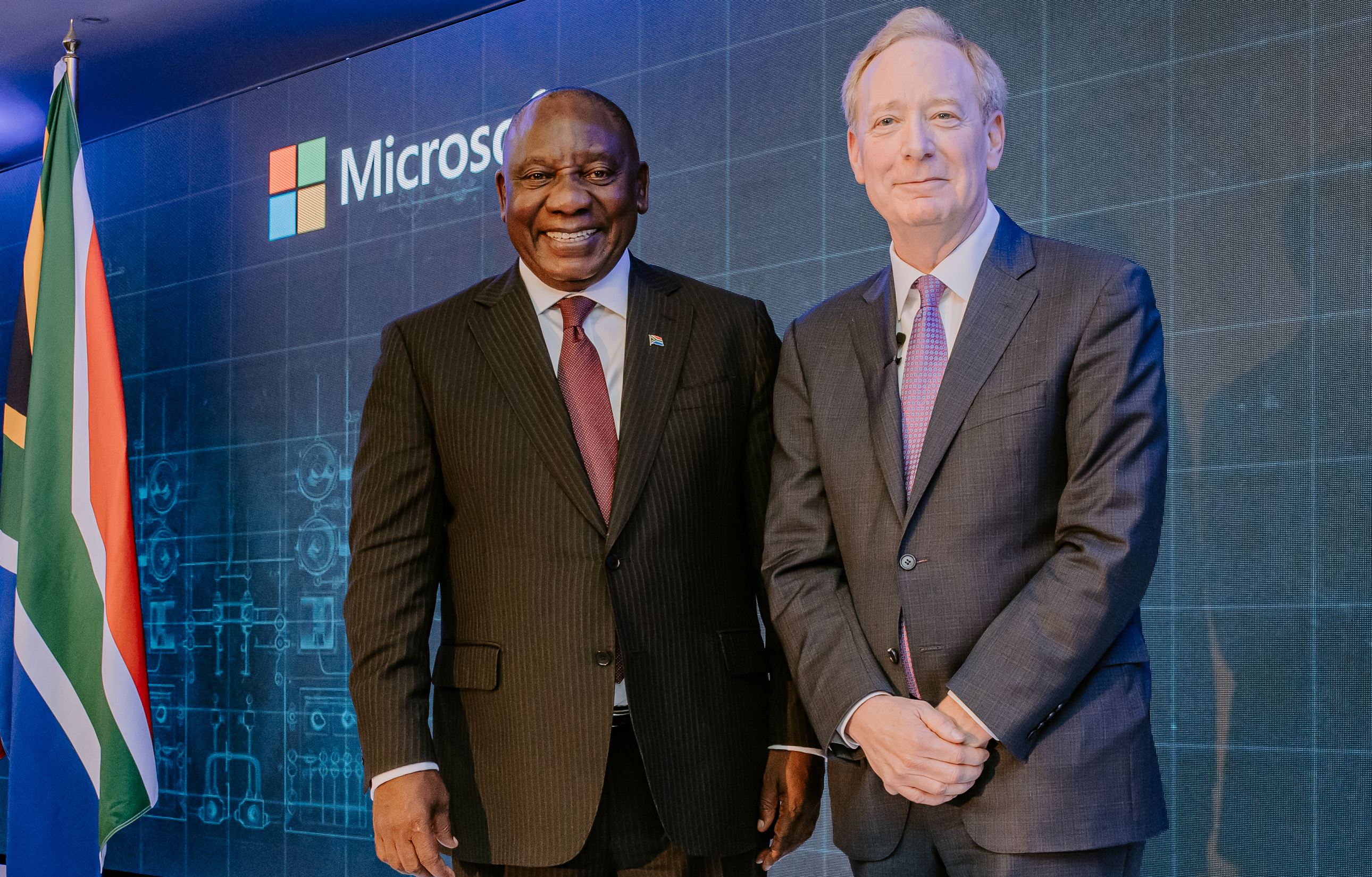Microsoft’s announcement of a R5.4-billion investment in South Africa’s AI and cloud infrastructure may initially appear to be a groundbreaking leap towards technological progress.
However, this ambitious investment, announced by Microsoft vice-chairperson and president Brad Smith during a press conference attended by President Cyril Ramaphosa, raises critical concerns surrounding practical energy constraints, economic impacts and potential risks of deepening digital inequalities.
“We’re not just building infrastructure,” Smith proclaimed at the press conference on 6 March 2025. “We’re catalysing a digital future aimed at economic growth, youth empowerment and societal transformation.”
Despite this commitment, navigating a successful AI strategy in South Africa presents potential pitfalls.
Expansion or ambiguity?
Smith announced expansions to Microsoft’s Johannesburg and Cape Town data centres as part of the investment. This commitment contrasts sharply with the company’s broader global trend of reducing data centre leases – attributed to shifting global AI demand – raising questions about whether South Africa’s expansion genuinely reflects local needs or strategic positioning in emerging markets.
Responding to Daily Maverick’s questions, a Microsoft spokesperson said: “Microsoft is on track to invest approximately $800-billion to build out AI-enabled data centres in… 2025.”
Yet, this declaration leaves it unclear whether South African data centres address real demand or serve as experimental investments amid global uncertainty.
Technological advancements like Deepseek R1, a powerful AI model operable on standard commercial hardware, further question the need for extensive data centre infrastructure. Deepseek demonstrates that costly, resource-intensive data centres may not be necessary, making Microsoft’s insistence on local infrastructure subject to scrutiny – particularly given the significant electricity demands data centres place on South Africa’s overstretched power grid amid ongoing load shedding.
Countries like Ireland, hosting major data centres due to favourable taxation, have faced power shortages and ecosystem challenges directly tied to such investments, providing a cautionary example.
Upskilling initiatives
Microsoft’s pledge to fund certifications for 50,000 young South Africans next year, aiming to skill one million individuals by 2026, presents another optimistic front. However, while Microsoft claims that 95,000 individuals achieved certification in 2024, with 1,800 securing employment, these figures remain unverified and raise concerns about meaningful job creation, with less than 2% employment success.
Accessibility and inequality
Smith likened AI to electricity: “AI is like electricity. It’s a general-purpose technology. It has the potential to impact every part of the economy and every part of society, just as electricity did.”
Microsoft further commented to Daily Maverick: “AI is one of the most transformative technologies of our time – it will unlock profound possibilities for people, industry and society. As Microsoft, it’s our goal to democratise our breakthroughs in AI.”
However, this optimistic outlook ignores significant existing disparities in digital literacy, basic education and internet accessibility. Without directly addressing these foundational socioeconomic barriers, Microsoft’s AI efforts risk exacerbating rather than alleviating inequality.
AI data centres, central to Microsoft’s vision, require substantial electricity – a critical issue in a country plagued by persistent load shedding. Expanding energy-intensive infrastructure without stabilising electricity supplies could worsen existing issues, undermining economic stability and sustainability.
A report by the International Energy Agency earlier this year estimated that data centres, cryptocurrencies, and artificial intelligence (AI) consumed about 460 TWh of electricity worldwide in 2022, almost 2% of total global electricity demand. "Depending on the pace of deployment, range of efficiency improvements as well as artificial intelligence and cryptocurrency trends, we expect global electricity consumption of data centres, cryptocurrencies and artificial intelligence to range between 620-1 050 TWh in 2026, with our base case for demand at just over 800 TWh – up from 460 TWh in 2022. This corresponds to an additional 160 TWh up to 590 TWh of electricity demand in 2026 compared to 2022, roughly equivalent to adding at least one Sweden or at most one Germany," the report states.

A discrepancy between vision and reality
AI integration demands reliable internet, advanced education and digital literacy – resources still scarce in many South African communities.
Ramaphosa said in his speech that “we are committed to working closely with companies like Microsoft to ensure our young people acquire digital skills, preparing them for future jobs and enhancing their capacity to innovate”.
Yet, clear implementation strategies remained absent from all speakers.
The importance of accountability
While Microsoft’s R5.4-billion investment has significant potential for South Africa’s digital economy, notable risks accompany it, including energy sustainability concerns, questionable employment impacts, unresolved data sovereignty issues and potential digital divides
For South Africa to genuinely benefit from Microsoft’s investment, focus must shift from mere promises and hype. Achieving tangible progress requires clearly defined goals, measurable outcomes and transparent reporting on the impact of these initiatives, as well as engagement with the structural issues that would facilitate and unlock value. Only then can South Africa ensure meaningful and equitable digital advancement rather than another costly experiment. DM





